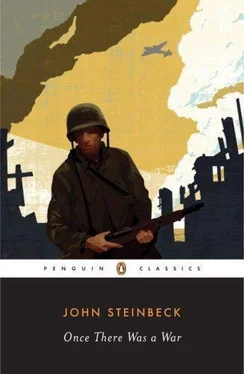John Steinbeck - Once there was a war
Здесь есть возможность читать онлайн «John Steinbeck - Once there was a war» весь текст электронной книги совершенно бесплатно (целиком полную версию без сокращений). В некоторых случаях можно слушать аудио, скачать через торрент в формате fb2 и присутствует краткое содержание. Город: New York, Год выпуска: 1960, Издательство: Bantam Books, Жанр: Классическая проза, на английском языке. Описание произведения, (предисловие) а так же отзывы посетителей доступны на портале библиотеки ЛибКат.
- Название:Once there was a war
- Автор:
- Издательство:Bantam Books
- Жанр:
- Год:1960
- Город:New York
- ISBN:нет данных
- Рейтинг книги:3 / 5. Голосов: 1
-
Избранное:Добавить в избранное
- Отзывы:
-
Ваша оценка:
- 60
- 1
- 2
- 3
- 4
- 5
Once there was a war: краткое содержание, описание и аннотация
Предлагаем к чтению аннотацию, описание, краткое содержание или предисловие (зависит от того, что написал сам автор книги «Once there was a war»). Если вы не нашли необходимую информацию о книге — напишите в комментариях, мы постараемся отыскать её.
Once there was a war — читать онлайн бесплатно полную книгу (весь текст) целиком
Ниже представлен текст книги, разбитый по страницам. Система сохранения места последней прочитанной страницы, позволяет с удобством читать онлайн бесплатно книгу «Once there was a war», без необходимости каждый раз заново искать на чём Вы остановились. Поставьте закладку, и сможете в любой момент перейти на страницу, на которой закончили чтение.
Интервал:
Закладка:
Wing Commander Goat lives in a small house behind the Operations Room. His name and honors are painted over the door. It is very good luck to go to him and stroke his sides and rub his horns before going out on operations. He does not go out on operations himself. There is not room in the Typhoons for him, but if it were possible to squeeze him in he would be taken, and then heaven knows what great action might not take place.
This goat has only truly bad habit. He loves beer, and furthermore is able to absorb it in such quantities that even the mild, nearly non-alcoholic English beer can make him tipsy. In spite of orders to the contrary he is able to seek out the evil companions who will give him beer. Once inebriated, he is prone to wander about sneering. He sneers at the American Army Air Force, he sneers at the Labor party, and once he sneered at Mr. Churchill. The sneer is probably inherent in the beer, since punch has quite a different effect on him.
In appearance this goat is not impressive. He has a shabby, pinkish fur and a cold, fishlike eye; his legs are not straight, in fact he is slightly knock-kneed. He carries his head high and his horns, painted in brilliant red and blue, more than offset any physical oddness. In every way, he is a military figure. He is magnificent on parade. Eventually he will be given a crypt in the Air Ministry and will die in good time of that military ailment, cirrhosis of the liver. He will be buried with full military honors.
But meanwhile Wing Commander William Goat, DSO, is the luck of his wing, and his loss would cause great unrest and even despondency.
STORIES OF THE BLITZ
LONDON, July 10, 1943 —
People who try to tell you what the blitz was like in London start with fire and explosion and then almost invariably end up with some very tiny detail which crept in and set and became the symbol of the whole thing for them. Again and again this happens in conversations. It is as though the mind could not take in the terror and the noise of the bombs and the general horror and so fastened on something small and comprehensible and ordinary. Everyone who was in London during the blitz wants to describe it, wants to solidify, if only for himself, something of that terrible time.
“It’s the glass,” says one man, “the sound in the morning of the broken glass being swept up, the vicious, flat tinkle. That is the thing I remember more than anything else, that constant sound of broken glass being swept up on the pavements. My dog broke a window the other day and my wife swept up the glass and a cold shiver went over me. It was a moment before I could trace the reason for it.”
You are going to dine at a small restaurant. There is a ruin across the street from the place, a jagged, destroyed stone house. Your companion says, “On one of the nights I had an engagement to have dinner with a lady at this very place. She was to meet me here. I got here early and then a bomb hit that one.” He points to the ruin. “I went out in the street. You could see plainly, the fires lighted the whole city. That front wall was spilled into the street. You could see the front of a cab sticking out from the pile of fallen stone. Thrown clear, right at my feet as I came out of the door, was one pale blue evening slipper. The toe of it was pointing right at me.”
Another points up at a wall; the building is gone, but there are five fireplaces, one above another, straight up the wall. He points to the topmost fireplace, “This was a high-explosive bomb,” he says. “This is on my way to work. You know, for six months there was a pair of long stockings hanging in front of that fireplace. They must have been pinned up. They hung there for months, just as they had been put up to dry.”
“I was passing Hyde Park,” says a man, “when a big raid came over. I went down into the gutter. Always did that when you couldn’t get a shelter. I saw a great tree, one like those, jump into the air and fall on its side not so far from me — right there where that scoop is in the ground. And then a sparrow fell in the gutter right beside me. It was dead all right. Concussion kills birds easily. For some reason I picked it up and held it for a long time. There was no blood on it or anything like that. I took it home with me. Funny thing, I had to throw it right away.”
One night, when the bombs screamed and blatted, a refugee who had been driven from place to place and tortured in all of them until he finally reached London, couldn’t stand it any more. He cut his throat and jumped out of a high window. A girl, who was driving an ambulance that night, says, “I remember how angry I was with him. I understand it a little now, but that night I was furious with him. There were so many who got it that night and they couldn’t help it. I shouted at him I hoped he would die, and he did.
“People save such strange things. One elderly man lost his whole house by fire. He saved an old rocking chair. He took it everywhere with him; wouldn’t leave it for a moment. His whole family was killed, but he hung on to that rocking chair. He wouldn’t sit in it. He sat on the ground beside it, but you couldn’t get it away from him.”
Two reporters sat out the blitz in the Savoy Hotel, playing chess and fortifying themselves. When the bombs came near they went under the table. “One or the other of us always reached up and cheated a little,” the reporter says.
Hundreds of stories, and all of them end with a little incident, a little simple thing that stays in your mind.
“I remember the eyes of people going to work in the morning,” a man says. “There was a quality of tiredness in those eyes I haven’t forgotten. It was beyond a tiredness you can imagine — a desperate kind of weariness that never expected to be rested. The eyes of the people seemed to be deep, deep in their heads, and their voices seemed to come from a long distance. And I remember during a raid seeing a blind man standing on the curb, tapping with his stick and waiting for someone to take him across through the traffic. There wasn’t any traffic, and the air was full of fire, but he stood there and tapped until someone came along and took him to a shelter.”
In all of the little stories it is the ordinary, the commonplace thing or incident against the background of the bombing that leaves the indelible picture.
“An old woman was selling little miserable sprays of sweet lavender. The city was rocking under the bombs and the light of burning buildings made it like day. The air was just one big fat blasting roar. And in one little hole in the roar her voice got in — a squeaky voice. ‘Lavender!’ she said. ‘Buy Lavender for luck.’ ”
The bombing itself grows vague and dreamlike. The little pictures remain as sharp as they were when they were new.
LILLI MARLENE
LONDON, July 12, 1943 —
This is the story of a song. Its name is “Lilli Marlene” and it was written in Germany in 1938 by Norbert Schultze and Hans Leit. In due course they tried to publish it and it was rejected by about two dozen publishers. Finally it was taken up by a singer, Lala Anderson, a Swedish girl, who used it for her signature song. Lala Anderson has a husky voice and is what you might call the Hildegarde type.
“Lilli Marlene” is a very simple song. The first verse of it goes: “Underneath the lanterns, by the barracks square, I used to meet Marlene and she was young and fair.” The song was as simple as that. It went on to tell about Marlene, who first liked stripes and then shoulder bars. Marlene met more and more people until, finally, she met a brigadier, which was what she wanted all along. We have a song with much the same amused cynicism.
Eventually Lala made a record of the song and even it was not very popular. But one night the German station in Belgrade, which sent out programs to Rommel’s Afrika Korps, found that, due to a little bombing, it did not have many records left, but among a few uninjured disks was the song “Lilli Marlene.” It was put on the air to Africa and by the next morning it was being hummed by the Afrika Korps and letters were going in demanding that it be played again.
Читать дальшеИнтервал:
Закладка:
Похожие книги на «Once there was a war»
Представляем Вашему вниманию похожие книги на «Once there was a war» списком для выбора. Мы отобрали схожую по названию и смыслу литературу в надежде предоставить читателям больше вариантов отыскать новые, интересные, ещё непрочитанные произведения.
Обсуждение, отзывы о книге «Once there was a war» и просто собственные мнения читателей. Оставьте ваши комментарии, напишите, что Вы думаете о произведении, его смысле или главных героях. Укажите что конкретно понравилось, а что нет, и почему Вы так считаете.









